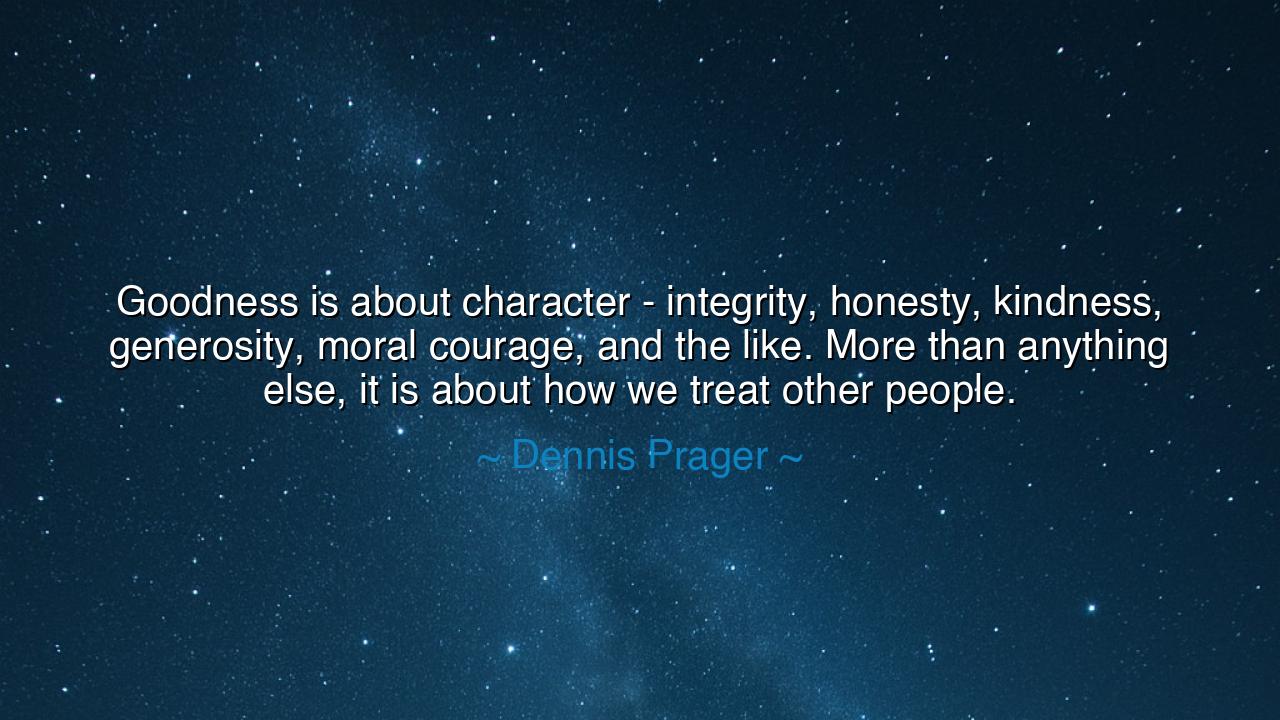
Goodness is about character - integrity, honesty, kindness
Goodness is about character - integrity, honesty, kindness, generosity, moral courage, and the like. More than anything else, it is about how we treat other people.






In the tapestry of moral wisdom, Dennis Prager wove a truth both radiant and enduring: “Goodness is about character — integrity, honesty, kindness, generosity, moral courage, and the like. More than anything else, it is about how we treat other people.” These words, born not from abstraction but from the soil of human experience, carry the fragrance of timeless truth. For they remind us that the worth of a life is not measured by status, brilliance, or fortune, but by the goodness that flows from the heart — goodness proven not in thought or speech, but in the way we touch the lives of others.
Goodness is the foundation of all virtue. It is the unseen light that gives warmth to greatness, the gentle strength that holds civilization together. Without goodness, wisdom becomes manipulation, power becomes tyranny, and freedom becomes chaos. Prager, speaking as one rooted in the moral traditions of humanity, calls us back to the essence of virtue — to character, that sacred alignment between what we know is right and what we choose to do. Integrity, honesty, kindness, generosity, and moral courage are not adornments of the soul, but its pillars. To cultivate them is to build within oneself a temple fit for truth.
Character is not revealed in grand speeches or noble dreams, but in the quiet moments when no one watches. The ancients understood this well. For what is a person’s honor, if not their consistency in both light and shadow? To act rightly when praised is easy; to do so when forgotten is divine. Integrity is the art of being whole — of refusing to be divided between what is convenient and what is just. It is the strength to remain upright when temptation beckons and the humility to admit fault when one has strayed.
Consider the life of Oskar Schindler, a man once known for his greed, who during the fires of war discovered within himself the light of compassion. At great risk to his own life, he sheltered and saved more than a thousand Jews from the hands of destruction. He was no saint by nature, yet in the crucible of conscience he became one by choice. His deeds were not born of desire for glory, but of moral courage — the quiet decision to value others’ lives above his own comfort. In that choice, he embodied what Prager declares: that goodness is measured not by what we possess, but by how we treat other people.
For all the philosophies of humankind, the heart of goodness remains the same — to see in another’s eyes the reflection of one’s own soul. Kindness is the language of the spirit that requires no translation; generosity is the act of faith that what we give returns to us in peace. And moral courage, that rarest of virtues, is the bridge between knowing and doing. To treat others well even when it costs us — this is the highest form of goodness, the mark of a soul that has conquered its own self-interest.
The ancients would say: “To rule others, first rule yourself.” For only the self-disciplined can be just, only the truthful can be trusted, only the kind can heal. Thus, goodness is not weakness but power in its purest form — power governed by compassion, guided by conscience, and measured by mercy. The world honors brilliance, but it survives by goodness. Kingdoms fall, empires fade, but a single act of kindness endures longer than stone.
Let the lesson be clear: Goodness is not an emotion; it is a practice. Each day is an altar upon which we may offer honesty instead of deceit, forgiveness instead of bitterness, courage instead of fear. Do not wait for perfect conditions to be good — for the smallest act done with pure intent outweighs the grandest gesture performed for praise. Look upon others with dignity, speak truth with gentleness, give without counting the cost, and stand firm when justice calls your name.
For in the end, all that we build, all that we achieve, fades like dust before time. But the measure of a life — the true legacy of the soul — is how we treated those who walked beside us. And when the long night falls and our names are forgotten, our goodness will remain, shining quietly in the hearts we have touched, echoing across the ages like a sacred song of humanity itself.






AAdministratorAdministrator
Welcome, honored guests. Please leave a comment, we will respond soon